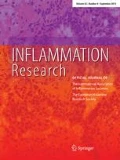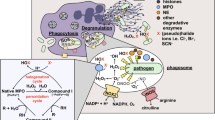Abstract
Objective. HOCl, a major bactericidal product of neutrophil MPO - halide system reacts with taurine to form taurine chloramine (TauCl), a less toxic anti-inflammatory mediator. Recently, it has been reported that HOCl may also react with nitrite (NO2 -), a major end-product of nitric oxide (NO) metabolism, to form very active oxidant, nitryl chloride (NO2Cl). The present study was conducted to elucidate the effect of nitrite on bactericidal and some immunoregulatory properties of HOCl and TauCl.¶Materials: TauCl was prepared from NaOCl and taurine. The reaction was carried out at pH 5.0 and pH 7.4, in the presence or absence of nitrite. All reactions were monitored by UV absorption spectra.¶Methods: Bactericidal activity of HOCl and TauCl in the presence of nitrite was tested by incubation of E. coli with the compounds and determined by the pour-plate method. To test the effect of the compounds on activity of inflammatory cells, murine peritoneal neutrophils (PMN) and macrophages were used. The cells were activated in vitro with either LPS, IFN-γ or zymosan and the production of following mediators was measured: reactive oxygen species using luminol-dependent chemiluminescence; nitric oxide by Griess reaction; TNF-α using capture ELISA. In addition, we tested the effect of HOCl and TauCl on activity of myeloperoxidase (MPO).¶Results: At physiological pH nitrite reacts with HOCl but not with TauCl. This reaction was abolished in the presence of taurine. Nitrite prevented HOCl-mediated bacterial killing, inhibition of MPO activity, cellular cytotoxicity and inhibition of TNF-α Production. Nitrite did not affect any activity of TauCl.¶Conclusion: We have shown that nitrite may react in vitro with HOCl but not with TauCl, to form new biologically active product(s). We did not confirm the hypothesis that a product of HOCl reaction with nitrite is more toxic than HOCl. To the contrary, we found that nitrite diminished bactericidal and immunoregulatory properties of HOCl. In vivo, nitrite will also compete with taurine for reaction with PMN-released HOCl. Nevertheless, due to high concentration of taurine in PMN cytosol, formation of TauCl will be a major regulatory mechanism of MPO-halide-system.
Similar content being viewed by others
Author information
Authors and Affiliations
Additional information
Received 6 September 1999; returned for revision 13 January 2000; accepted by M.P. Seed 27 January 2000
Rights and permissions
About this article
Cite this article
Marcinkiewicz, J., Chain, B., Nowak, B. et al. Antimicrobial and cytotoxic activity of hypochlorous acid: interactions with taurine and nitrite. Inflamm. res. 49, 280–289 (2000). https://doi.org/10.1007/PL00000208
Published:
Issue Date:
DOI: https://doi.org/10.1007/PL00000208




